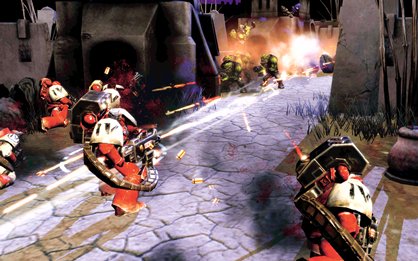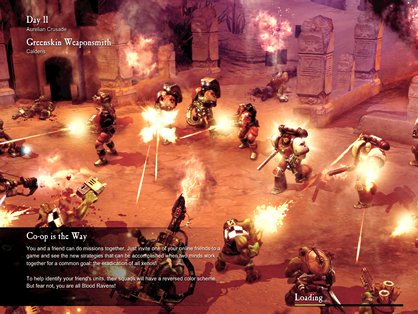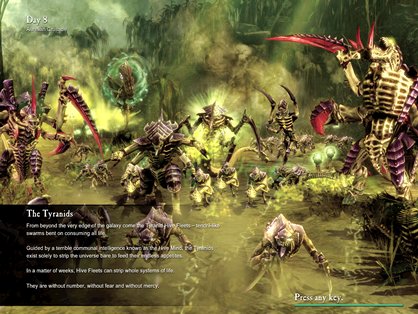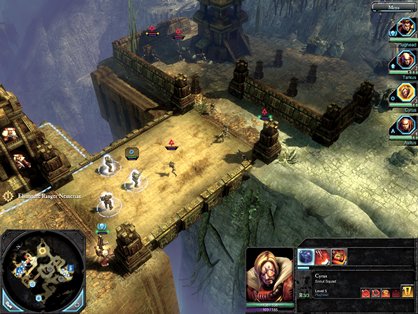How Dawn of War II risked it all to push a genre forward
INTERVIEW: Relic's producer ruminates on going big, pissing off fans, and what to do next
Changing a winning formula isn’t always the wisest course of action. It can also sometimes be the best one and evidently something Jeff Lydell, a producer at Relic Entertainment, believes applies to the Warhammer 40,000 real-time strategy game Dawn of War II.

This was Relic’s attempt to move the game about men with huge shoulder pads and bigger guns into the modern age. Rather than go for the template used in the first game and its myriad add-ons, Relic modeled DOWII on their successful squad-based RTS Company of Heroes. As we were so impressed by the game, we sent a pack of howling Orks to Relic’s office to drag Jeff Lydell out for an interrogation. We pumped him for information until he was red, sore and relieved to be alive. These words are the results of that intense session.
Final Fight

“When we had our last team play test for Last Stand, I wasn’t working on it, but I went to the guy who was the producer at the time (I was an associate producer back then), and I said we need to spend more money on this. Not because it was bad, but because it was really good.
“I had incredibly high hopes and a high degree of confidence for that game mode. The thing that makes it compelling is the progression. Each time you play it there’s gear that you unlock. And when I say more loot, I mean more kinds. So it’s less about having 10 different types of shotgun, and more about weapon choices and more options to take for how you want to kit out your guy.
“So as an example, we’re introducing the melta gun, which is a high-powered anti-vehicle gun for ranged squads. We also have lightning claws, and a few other things that are very satisfying. I am a fan of the Lictor and the Warlock for their manipulation. There’s something very satisfying about that, and the slap you get to do to somebody with that.”
Protect and Serve
Sign up to the GamesRadar+ Newsletter
Weekly digests, tales from the communities you love, and more

“It’s funny because there are a lot of different audiences we serve when we release our games, and some of the people who ‘got it’ the fastest were the diehard Warhammer 40,000 fans. The original Dawn of War players had a big adjustment to make, because if they hadn’t played Company of Heroes, they weren’t around for that ride, and they were probably the hardest hit. And then the Company of Heroes players were looking for certain features that we hadn’t included in exchange for others.
“By and large, we did have a lot of people pick up the product and we’ve had a bigger audience. It’s been a big success and we hope that anybody who didn’t like it for what it didn’t have starts to identify with what it does.
“Because a lot of the customisation of the campaign has been well received, those are areas we’re still expanding on. We’re giving you more gear, more loot, more places to customise your guys. That’s something that everybody will like. But the only other thing I’ll disclose is that the Space Marines are getting a Librarian.”
Hand to Hand

“Sometimes you go part of the way with a feature and then it doesn’t work out. We had an example with melee combat and buildings in the first one, where we had storming. That is, your units could run in and punch people in the building. But there were a ton of problems with it.
“One was that it almost instantly made the building useless to anyone who had a ranged squad in there, because the melee squad could just run in and kill them. The other thing was that you couldn’t see it, so it wasn’t satisfying.
“As for Titans, we had to make a map on each one, depending on the class. There’s always content that we play with at the concept stage that just stops there. Sometimes we come up with ideas that don’t fit with the lore.”
Angels and Demons

“There’s a lot of really cool shit in the Chapters, and that’s one of the main things that they bring to the Warhammer 40,000 universe.
“The biggest reason why we go with our own Chapter and not the Blood Angels [a famous, canonical Chapter of Space Marines] is that we’re not tied to the lore of anyone. It’s not about the visuals, but when we want to tell a story, we want to be able to tell that story and take it in a direction, and both us and Games Workshop are happier if we’re not having to retrofit that story to an existing chapter and existing characters.”


